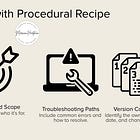My 4-year old son is now at the stage where he wants to cook. He has his apron, his tools, and understands the big idea. But as he dashes in the kitchen and declares that we’re making parfait, the first thing out his mouth is, “what do we do first mommy?”
This is the simplest representation of moving from the Inspired Block to the Simple Robot Block.
He gets the big picture that he can put foods together and it makes deliciousness. This shared understanding from the Inspired Block sets him up for to getting grounded experience.
He doesn’t want to discuss or theorize. He doesn’t want to run through the what if’s or what then’s. He wants to DO. NOW.
So, I give him step by step instructions of a simple and delicious win.
And the Simple Robot series is exactly that. It’s providing step by step instructions for simple and clear wins.
There’s no discussion or theorization. Yet. Just ……. Do. Many. Times.
But in the complexity of the workforce, there are different recipes for different contexts.
Choosing the Right Recipe Method
Procedural Recipes: Runbooks are ideal for complex procedures that are done infrequently enough for details to be forgotten, ensuring consistency each time they're performed. They’re especially useful when tasks involve delays, waiting periods, or coordination with other stakeholders.
Micro-Behavioral Recipes: Micro-behaviors are ideal for habitual, frequently performed tasks that can be executed independently without triggering other actions. They help standardize actions that may look the same on the surface but vary based on individual skill levels, like writing an assertion in a unit test.
Cycle Recipes: Cycle recipes are ideal for tasks that demand deep thinking while juggling broader context, as the cycle externalizes and manages that context. They’re especially useful when frequent, short iterations lead to better results.
For more details on each recipe method, please check out the individual post.
Are you a free subscriber? If so, check out the highlights from videos accessed by paid subscribers. This will give you a peek into the kind of content to expect, with each weekly video providing 8-10 minutes of insights.
Video Notes:
Context of the needs for Simple Robot recipes.
Example of procedural recipe.
Example of micro-behavioral recipe.
Short interview with Arlo Belshee on the value of cycle recipes for iterative development.










